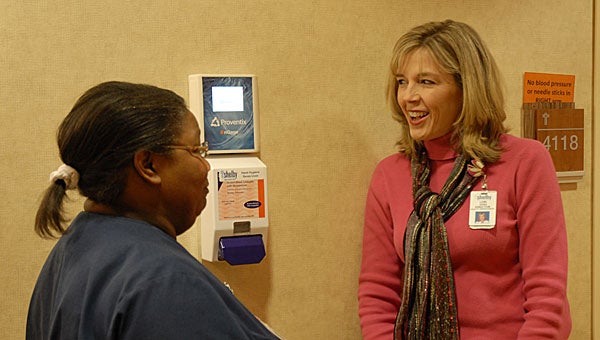Shelby Baptist pilots smart hand washing
Published 5:41 pm Tuesday, March 1, 2011

Shelby Baptist Medical Center nurse Jeanie Todd, left, and Director of Quality Lori Quinn, right, look at weather information displayed on a Proventix screen after Todd sanitized her hands. (Reporter Photo/Neal Wagner)
By NEAL WAGNER / City Editor
When Shelby Baptist Medical Center nurse Jeanie Todd approached the hand sanitizer station in the hospital’s hallway, the small white box immediately recognized her, knew when she last washed her hands and had the day’s weather report on display.
“There is some very good information displayed on those panels. It gives me the weather every day,” Todd said. “Hand washing is important in any field, especially in health care field.”
Shelby Baptist recently launched a pilot program for a hand-washing network installed by the Proventix Systems company.
Through the program, many hospital employees wear small electronic devices attached to their name tags. When the employee approaches a hand-washing or sanitizing station, the station records whether or not the employee cleaned their hands.
The employees can also program small screens above the washing station to display personal information, such as weather forecasts or sports scores.
“The intent is to engage the employees and compel them to engage in a hand-washing event when appropriate,” said Proventix Chief Executive Officer Harvey Nix.
While Shelby Baptist staff members are washing or sanitizing their hands, the Proventix screens can also display educational messages and important information pertaining to the patient in the room.
“Now you can drive educational content to a specific user and about a specific patient,” Nix said. “It creates a more efficient environment.”
Through the Proventix system, the hospital can collect data and evaluate how often employees visit the hand-washing and sanitizing stations, and how the number correlates to patient health.
“In the health care field, (the Center for Disease Control) is calling for a new science of quality. This system is not about monitoring an employee’s every move, it’s about how they use the hand hygiene opportunities they encounter every day,” Nix said.
The CDC currently promotes a set of hand-washing “rules” outlining how frequently, how long and how many times per day a health care employee should wash their hands.
Information obtained from the Proventix system could be used to provide concrete evidence for the CDC hand-washing guidelines, or could even be used to help the agency change its rules.
The system is currently installed in one section of Shelby Baptist, but could be installed in all Baptist Health System facilities in the future, said Shelby Baptist Director of Business Development April Weaver.
“This is just one more way we are trying to improve patient safety,” Weaver said.
Nix said the system is aimed at monitoring employees’ patterns, not punishing them for failing to wash their hands each time they near a sink or sanitizing station.
“This is not a penal system. It’s not creating new work for anyone, it’s just helping us understand the hand-hygiene process,” Nix said. “Hand washing is an issue worldwide.
“Whatever information we gather here will impact this facility and the community,” he added.









